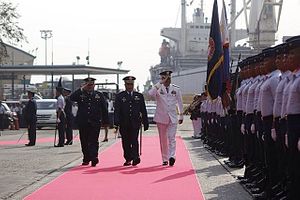On September 6, the Philippines and France signed an agreement that would facilitate the acquisition of five vessels for the Philippine Coast Guard. The inking of the pact illustrates Manila’s continuing efforts to strengthen partnerships with countries such as France as it looks to boost its capabilities to address manifold challenges in the maritime realm.
As I have noted before, the Philippines and France have a longstanding relationship that has been deepening in the defense realm in recent years. Indeed, last May, both sides inked a new defense agreement that they had been negotiating for years. The agreement set out an overall framework for developing security ties, including not just visits and dialogues but also training, capacity-building, and collaboration on defense equipment, logistics, and the defense industry (See: “Philippines, France Ink New Defense Pact”).
One of the tangible manifestations of this defense relationship that has been discussed for years — dating back to the administration of former President Benigno Aquino III — has been the delivery of vessels from France to the Philippines under the Philippine Ports and Coast Guard Capability Development Project. The Philippines, which remains one of the weakest militaries in the region, has been looking to accelerate the pace of its military modernization to address a range of challenges, including the Philippine Coast Guard (PCG) (See: “Assessing Malaysia’s Coast Guard in ASEAN Perspective”).
This particular project, which was formalized with a contract signing between the Department of Transportation and French shipbuilder OCEA in September 2014, was expected to see the Philippines receive five vessels – one 82-meter Offshore Patrol Vessel (OPV) and four 24-meter Fast Control Boats (FPB). It also includes five-year preventive maintenance, spare parts for five years, and technical assistance and training for the crew.
The project has continued to move along under new Philippine President Rodrigo Duterte, who took office in June 2016. For instance, in April, Transportation Secretary Arthur Tugade visited the OCEA shipyard in Sables d’Olonne, France to inspect the four 24-meter fast patrol boats.
On September 6, Department of Transportation Undersecretary for Maritime Affairs Felipe Judan and OCEA’s director of maritime safety and security, Fabrice Weinbach, signed the contract effectiveness agreement for the acquisition of the vessels. The signing was witnessed by Secretary Arthur Tugade and French Embassy representative Laurent Estrade.
The first fast patrol boat is expected to be delivered to the Philippines after eight months, with remaining ones arriving in succession after a 45-day delivery gap, and the OPV arriving up to 23 months following the signing of the contract. The vessels, Philippine officials have said, are expected to be used by the PCG for a range of tasks, including maritime search and rescue, maritime environmental protection, patrols of the country’s exclusive economic zone, and deterring piracy and other crimes in southern Mindanao (See: “Philippines Coast Guard in the Spotlight Amid Islamic State Threat”).

































